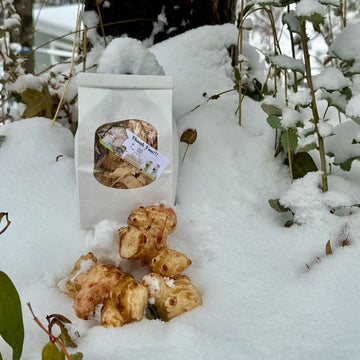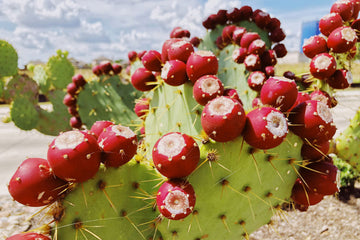Why Planting Jerusalem Artichokes Early and Overwintering Them is a Game Changer
by Philip Abell on Jan 27, 2025

Why You Should Plant Jerusalem Artichokes Early and Overwinter Them
Jerusalem artichokes, also called sunchokes, are a versatile and hardy vegetable native to North America. They’re known for their nutty flavor, versatility in cooking, and health benefits. If you’re thinking about growing these hearty tubers, one of the best strategies for success is planting them early and overwintering them if you can. But why is this method so effective? Here’s why you should consider getting your Jerusalem artichokes into the ground early and why overwintering them is a great idea.
1. Maximize Growth Potential
Jerusalem artichokes are technically perennial plants, which means they can survive year after year with proper care. However, they thrive with a long growing season. By planting them early, ideally in spring as soon as the soil is workable, you give the plants a full season to develop their tubers. The longer they have to grow, the more likely they are to yield a larger and healthier crop.
The plants grow quickly once established, but they need that extra time to form large, nutrient-dense tubers. If you plant later in the season, you may not get the size or quantity of tubers that an early planting provides.
2. Better Soil Development
Jerusalem artichokes have deep, spreading root systems, which makes them great for breaking up compacted soil and improving soil structure. When you plant early, you give them more time to develop these strong root systems. A deep, well-established root system helps the plants access water and nutrients more effectively, which in turn results in healthier tubers.
If you wait until later in the season to plant, the roots may not have enough time to fully develop, which could lead to smaller yields and potentially weaker plants.
3. Natural Overwintering Benefits
One of the most remarkable things about Jerusalem artichokes is their ability to overwinter in the ground. In fact, overwintering them is a technique that many gardeners swear by for improving yield and quality. After the growing season ends, the tubers can be left in the soil over the winter months. This allows them to develop better flavors—many gardeners report that the tubers taste sweeter after a frost. The cold temperatures help convert some of the starches into sugars, which gives the sunchokes a more pleasant, mellow flavor.
Additionally, overwintering Jerusalem artichokes in the ground means you don't need to dig them up right after the first frost, and you can harvest them whenever you’re ready in the following year. You may also get a jump-start on next year’s crop, as the tubers tend to sprout earlier in the spring than they would if they had been dug up and stored.
4. Increased Resilience
Jerusalem artichokes are tough plants, but like all crops, they can be vulnerable to early frost and unseasonably cold weather. Planting them early gives them time to establish before the risk of frost becomes too great, which can help protect them from stunted growth or damaged plants. Additionally, overwintering the tubers in the ground (in zones where the soil doesn’t freeze solid) can protect them from extreme weather and pests that might otherwise damage or reduce the crop.
5. Less Work for You
Planting Jerusalem artichokes early and overwintering them is a win-win situation for gardeners who are looking for a low-maintenance crop. Once you plant them in the spring, you can largely leave them to grow without much intervention. You’ll still need to keep an eye on water and perhaps weed around them, but Jerusalem artichokes are relatively pest- and disease-resistant. After they die back in the fall, you don’t need to worry about digging them up immediately. You can leave them in the ground for easy winter storage and come back to harvest them when you need them.
6. A Sustainable Crop for Your Garden
Jerusalem artichokes are known for being very hardy and adaptable, making them a great option for sustainable gardening. They are drought-tolerant once established, and they don’t require a lot of fertilizer or special soil. Overwintering them not only reduces the need for storage space or extra work, but it also minimizes the environmental impact of your gardening practices. Instead of harvesting every tuber every year, you can simply allow them to naturally re-grow and spread in the soil, helping to build a more resilient garden over time.
7. You Get More Than Just Tubers
Another reason to plant Jerusalem artichokes early and let them overwinter is that you can harvest more than just the edible tubers. The plants produce beautiful sunflower-like blooms in late summer, which attract pollinators to your garden. These flowers can brighten up your landscape while helping support local biodiversity. Additionally, Jerusalem artichokes can be grown as a "living mulch," providing coverage and protecting the soil from erosion, especially in garden beds or areas prone to weed growth.
Tips for Planting and Overwintering Jerusalem Artichokes
- Plant Early: Aim to plant Jerusalem artichokes in early spring after the last frost, giving them as much time as possible to grow.
- Choose the Right Spot: They prefer full sun and well-drained soil but can tolerate a variety of soil types.
- Don’t Overcrowd: Space the tubers 12–18 inches apart to give them room to grow.
- Mulch for Protection: If you’re in a zone with freezing winters, consider adding mulch around the plants to protect the tubers from extreme cold.
- Harvest When Ready: After a frost, you can begin harvesting tubers. If overwintering them, wait until spring to dig them up, as they will remain edible and fresh in the soil.
Conclusion
Jerusalem artichokes are a fantastic, low-maintenance crop that can be grown with minimal fuss. By planting them early and overwintering them in the ground, you allow the plants to fully develop, creating larger, tastier tubers. Whether you're a beginner gardener or a seasoned pro, this strategy can help ensure a bountiful harvest with less work and more rewarding flavors.
Give it a try—plant early, let them overwinter, and enjoy the sweet, nutty taste of Jerusalem artichokes well into the following year.



